May-might--could表可能性用法
情态动词mustcancouldmaymight表推测用法
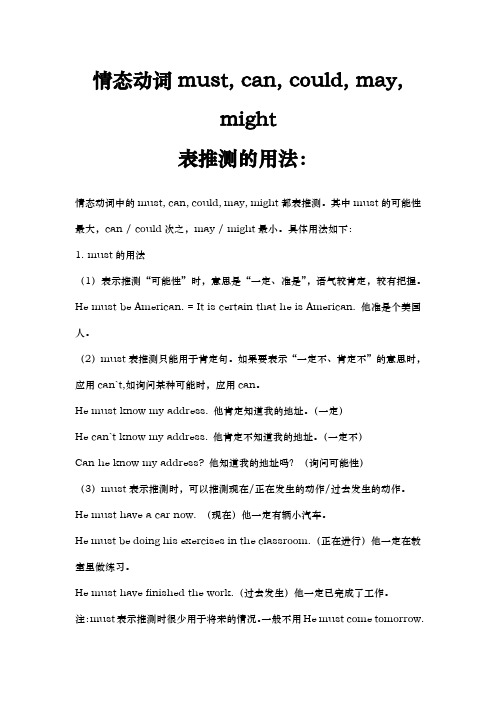
情态动词must, can, could, may,might表推测的用法:情态动词中的must, can, could, may, might都表推测。
其中must的可能性最大,can / could次之,may / might最小。
具体用法如下:1. must的用法(1)表示推测“可能性”时,意思是“一定、准是”,语气较肯定,较有把握。
He must be American. = It is certain that he is American. 他准是个美国人。
(2)must表推测只能用于肯定句。
如果要表示“一定不、肯定不”的意思时,应用can`t,如询问某种可能时,应用can。
He must know my address. 他肯定知道我的地址。
(一定)He can`t know my address. 他肯定不知道我的地址。
(一定不)Can he know my address? 他知道我的地址吗?(询问可能性)(3)must表示推测时,可以推测现在/正在发生的动作/过去发生的动作。
He must have a car now. (现在)他一定有辆小汽车。
He must be doing his exercises in the classroom.(正在进行)他一定在教室里做练习。
He must have finished the work.(过去发生)他一定已完成了工作。
注:must表示推测时很少用于将来的情况。
一般不用He must come tomorrow.可用It`s certain / I`m sure that he will come tomorrow.(4)在反意疑问句中,当附属部分含有表示推测意义的must时,疑问部分的助动词应与must后面的动词在非推测情况下的用法保持一致。
He must be a worker, isn`t he? (现在)他准时个工人,是吗?It must have rained last night, didn`t it? (过去)昨晚一定下雨了,是不是?You must have learned English for many years, haven`t you? (完成时)你一定学了好多年英语,是吗?2. can / could的用法(1)can表示推测“可能性”时,往往用于否定句或疑问句。
常用的情态动词八个用法

常用的情态动词八个用法情态动词是英语中非常重要的一类动词,它们可以用来表达说话者的态度、意愿、推测、建议等。
在英语中,常用的情态动词有八个,分别是can、could、may、might、shall、should、will和would。
下面我们来看看这八个情态动词的用法。
1. Can和CouldCan和could都表示能力或可能性。
Can表示现在的能力或可能性,而could则表示过去的能力或可能性。
例如:- I can speak English.(我会说英语。
)- When I was young, I could run very fast.(我小时候跑得很快。
)2. May和MightMay和might都表示可能性,但may的可能性更大一些。
例如:- It may rain tomorrow.(明天可能会下雨。
)- He might be late.(他可能会迟到。
)3. Shall和ShouldShall和should都表示建议或义务。
Shall用于第一人称,should 用于第二人称和第三人称。
例如:- Shall we go to the cinema tonight?(今晚我们去看电影好吗?)- You should study harder.(你应该更加努力学习。
)4. Will和WouldWill和would都表示意愿或推测。
Will表示现在或将来的意愿或推测,而would则表示过去或虚拟的意愿或推测。
例如:- I will help you with your homework.(我会帮你做作业。
)- If I had more time, I would travel around the world.(如果我有更多时间,我会周游世界。
)情态动词在英语中是非常重要的一类动词,掌握它们的用法对于学好英语非常有帮助。
比较情态动词must, can- could, may- might 用法
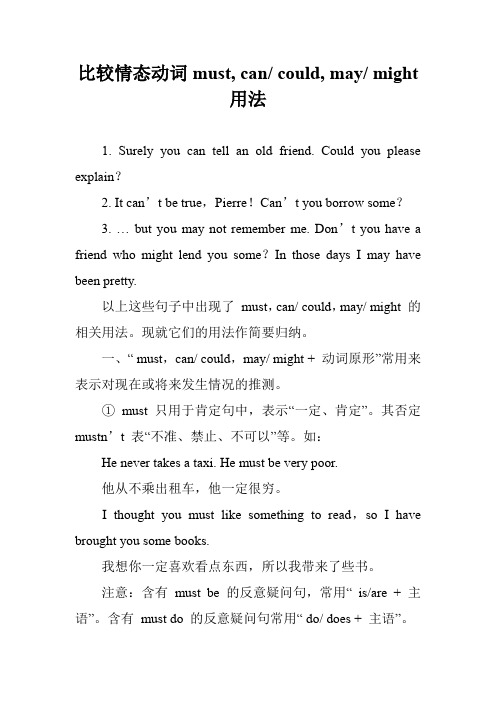
比较情态动词must, can/ could, may/ might用法1. Surely you can tell an old friend. Could you please explain?2. It can’t be true,Pierre!Can’t you borrow some?3. … but you may not remember me. Don’t you have a friend who might lend you some?In those days I may have been pretty.以上这些句子中出现了must,can/ could,may/ might 的相关用法。
现就它们的用法作简要归纳。
一、“ must,can/ could,may/ might + 动词原形”常用来表示对现在或将来发生情况的推测。
①must 只用于肯定句中,表示“一定、肯定”。
其否定mustn’t 表“不准、禁止、不可以”等。
如:He never takes a taxi. He must be very poor.他从不乘出租车,他一定很穷。
I thought you must like something to read,so I have brought you some books.我想你一定喜欢看点东西,所以我带来了些书。
注意:含有must be 的反意疑问句,常用“ is/are + 主语”。
含有must do 的反意疑问句常用“ do/ does + 主语”。
②can/ could 多用于否定句或疑问句中,偶尔用于肯定句中表示一种可能性。
如:Attending a ball can be exciting.出席舞会可能是令人兴奋的。
Michael can’t be a policeman,for he’s much too short.迈克不可能是警察,因为他太矮了。
可能性情态动词表达可能性的用法归纳
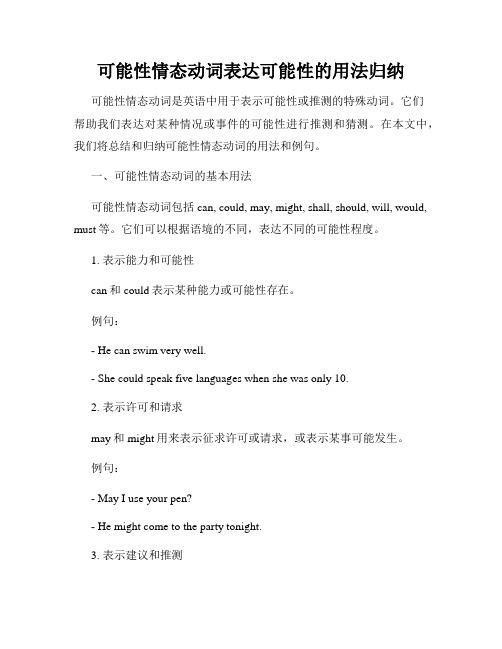
可能性情态动词表达可能性的用法归纳可能性情态动词是英语中用于表示可能性或推测的特殊动词。
它们帮助我们表达对某种情况或事件的可能性进行推测和猜测。
在本文中,我们将总结和归纳可能性情态动词的用法和例句。
一、可能性情态动词的基本用法可能性情态动词包括can, could, may, might, shall, should, will, would, must等。
它们可以根据语境的不同,表达不同的可能性程度。
1. 表示能力和可能性can和could表示某种能力或可能性存在。
例句:- He can swim very well.- She could speak five languages when she was only 10.2. 表示许可和请求may和might用来表示征求许可或请求,或表示某事可能发生。
例句:- May I use your pen?- He might come to the party tonight.3. 表示建议和推测should用来表示某事应该或可能发生;will和would用来表示对未来某事的推测或预测。
例句:- You should consult a doctor if you feel unwell.- It will rain tomorrow.- If she studies hard, she would pass the exam.4. 表示必要性和推测must表示某事必然发生;can't和couldn't表示某事不可能或很不可能发生。
例句:- He must be at home, his car is in the driveway.- It can't be true. I don't believe it.二、可能性情态动词的用法注意事项1. 句式结构:- 肯定句:主语 + 可能性情态动词 + 动词原形- 否定句:主语 + 可能性情态动词 + not + 动词原形- 疑问句:可能性情态动词 + 主语 + 动词原形?2. 句型转换:- 可能性情态动词也可以通过其过去式形式来表示过去的可能性。
情态动词must, can, could, may, might表推测的用法

情态动词must, can, could, may, might表推测的用法:情态动词中的must, can, could, may, might都表推测。
其中must的可能性最大,can / could次之,may / might最小。
具体用法如下:1. must的用法(1)表示推测“可能性”时,意思是“一定、准是”,语气较肯定,较有把握。
He must be American. = It is certain that he is American. 他准是个美国人。
(2)must表推测只能用于肯定句。
如果要表示“一定不、肯定不”的意思时,应用can`t,如询问某种可能时,应用can。
He must know my address. 他肯定知道我的地址。
(一定)He can`t know my address. 他肯定不知道我的地址。
(一定不)Can he know my address? 他知道我的地址吗?(询问可能性)(3)must表示推测时,可以推测现在/正在发生的动作/过去发生的动作。
He must have a car now. (现在)他一定有辆小汽车。
He must be doing his exercises in the classroom.(正在进行)他一定在教室里做练习。
He must have finished the work.(过去发生)他一定已完成了工作。
注:must表示推测时很少用于将来的情况。
一般不用He must come tomorrow.可用It`s certain / I`m sure that he will come tomorrow. (4)在反意疑问句中,当附属部分含有表示推测意义的must时,疑问部分的助动词应与must后面的动词在非推测情况下的用法保持一致。
He must be a worker, isn`t he? (现在)他准时个工人,是吗?It must have rained last night, didn`t it? (过去)昨晚一定下雨了,是不是?You must have learned English for many years, haven`t you? (完成时)你一定学了好多年英语,是吗?2. can / could的用法(1)can表示推测“可能性”时,往往用于否定句或疑问句。
表推测的情态动词用法小结
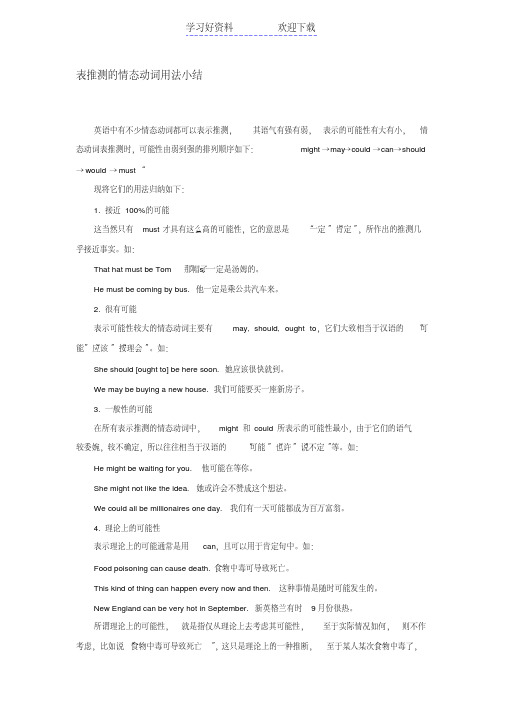
表推测的情态动词用法小结英语中有不少情态动词都可以表示推测,其语气有强有弱,表示的可能性有大有小,情态动词表推测时,可能性由弱到强的排列顺序如下:might→may→could→can→should →would→must“现将它们的用法归纳如下:1. 接近100%的可能这当然只有must才具有这么高的可能性,它的意思是“一定”“肯定”,所作出的推测几乎接近事实。
如:那帽子一定是汤姆的。
That hat must be Tom’s.He must be coming by bus. 他一定是乘公共汽车来。
2. 很有可能表示可能性较大的情态动词主要有may, should, ought to,它们大致相当于汉语的“可能”“应该”“按理会”。
如:She should [ought to] be here soon. 她应该很快就到。
We may be buying a new house. 我们可能要买一座新房子。
3. 一般性的可能在所有表示推测的情态动词中,might和could所表示的可能性最小,由于它们的语气较委婉,较不确定,所以往往相当于汉语的“可能”“也许”“说不定”等。
如:He might be waiting for you. 他可能在等你。
She might not like the idea. 她或许会不赞成这个想法。
We could all be millionaires one day. 我们有一天可能都成为百万富翁。
4. 理论上的可能性表示理论上的可能通常是用can,且可以用于肯定句中。
如:Food poisoning can cause death. 食物中毒可导致死亡。
This kind of thing can happen every now and then. 这种事情是随时可能发生的。
New England can be very hot in September. 新英格兰有时9月份很热。
浅谈英语中表示“可能”的词的用法

浅谈英语中表示“可能”的词的用法英语中有许多此表示“可能”,但归纳起来,无非就三类:1.情态动词may和can.2.形容词likely,possible,probable.3.副词maybe,perhaps,possibly,probably.一.情态动词may (might)和can (could)1.can在肯定句中,表示客观的(理论的)可能性,并不涉及具体某事是否会发生,常可以说明人或事物的特征。
要表达具体某事实际,发生的可能性时,不可用can,须用could,may,might 。
如:(1)A left-luggage office is a place where bags can be left for a shorttime ,especially at a railway station.[2003全国,28]行李寄存处,尤其是在火车站,使人们可以短期存放行李的地方。
(客观可能性)(2)Accidents can happen on such rainy days.这种下雨的天气可能会发生事故.(客观可能性)(3)Peter may come with us tonight ,but he isn’t sure yet.[1993全国,27]彼得今晚可能来我们这儿,但还没确定.(实际可能性)(4)We may go camping next Sunday.下星期我们可能去野营.(实际可能性)2.may not 表示“可能不”,can not/can’t表示“不可能”,can(could)可用于疑问意义。
如:(1)---- Is John coming by train ?---- He should ,but he may not .He likes driving his car.[2002全国,25](表示“可能不”)(2)A computer can’t think for itself ;it must be told what todo .[1991全国,15](表示“不可能”)(3)Mr Bush is on time for everything .How can it be that he waslate for the opening ceremony ?[2001上海,27]试比较:This can’t be done by him .这不可能是他干的。
May,might, could表可能性用法
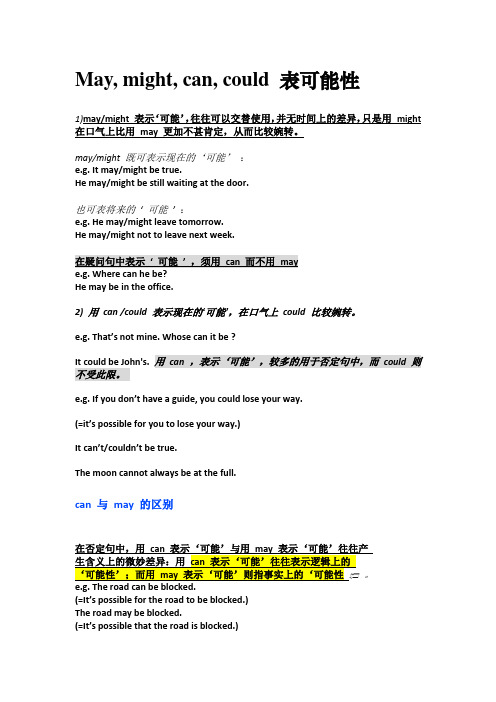
May, might, can, could 表可能性1)may/might 表示‘可能’,往往可以交替使用,并无时间上的差异,只是用might 在口气上比用may 更加不甚肯定,从而比较婉转。
may/might 既可表示现在的‘可能’:e.g. It may/might be true.He may/might be still waiting at the door.也可表将来的‘ 可能’ :e.g. He may/might leave tomorrow.He may/might not to leave next week.He may be in the office.2)用can /could 表示现在的‘可能’,在口气上could 比较婉转。
e.g. That’s not mine. Whose can it be ?It could be John's. 用can ,表示‘可能’,较多的用于否定句中,而could 则不受此限。
e.g. If you don’t have a guide, you could lose your way.(=it’s possible for you to lose your way.)It can’t/couldn’t be true.The moon cannot always be at the full.can 与may 的区别(=It’s possible for the road to be blocked.)The road may be blocked.(=It’s possible that the road is blocked.)Another example:Mr. Reed is in poor health. He can be ill at any time.Mr. Reed looks pale. He may be ill.She may/might have missed the train.She can’t/couldn’t have missed the train.用‘might/could+ 不定式完成体’ 有时可以表示本来可能发生但没有发生的,或者本来可能完成却没有完成的动作。
- 1、下载文档前请自行甄别文档内容的完整性,平台不提供额外的编辑、内容补充、找答案等附加服务。
- 2、"仅部分预览"的文档,不可在线预览部分如存在完整性等问题,可反馈申请退款(可完整预览的文档不适用该条件!)。
- 3、如文档侵犯您的权益,请联系客服反馈,我们会尽快为您处理(人工客服工作时间:9:00-18:30)。
May, might, can, could 表可能性
1)may/might 表示‘可能’,往往可以交替使用,并无时间上的差异,只是用might 在口气上比用may 更加不甚肯定,从而比较婉转。
may/might 既可表示现在的‘可能’:
e.g. It may/might be true.
He may/might be still waiting at the door.
也可表将来的‘ 可能’ :
e.g. He may/might leave tomorrow.
He may/might not to leave next week.
He may be in the office.
2)用can /could 表示现在的‘可能’,在口气上could 比较婉转。
e.g. That’s not mine. Whose can it be ?
It could be John's. 用can ,表示‘可能’,较多的用于否定句中,而could 则不受此限。
e.g. If you don’t have a guide, you could lose your way.
(=it’s possible for you to lose your way.)
It can’t/couldn’t be true.
The moon cannot always be at the full.
can 与may 的区别
(=It’s possible for the road to be blocked.)
The road may be blocked.
(=It’s possible that the road is blocked.)
Another example:
Mr. Reed is in poor health. He can be ill at any time.
Mr. Reed looks pale. He may be ill.
She may/might have missed the train.
She can’t/couldn’t have missed the train.
用‘might/could+ 不定式完成体’ 有时可以表示本来可能发生但没有发生的,或者本来可能完成却没有完成的动作。
e.g. You might have killed yoursel
f. (你本来可能送命的。
)
You might have finished the work last week.
summary
句
型
情态动词释义例子
肯定句May[ fml ],
might,
表示某事可能发生或称为现
实
He may/might be still waiting at the door. could
人们常用以表示所说的话并
不肯定
If you have a guide, you could lose your way.
can 是某件事在某个特定情况下
发生的可能性
The temperature can sometimes reach 35 ℃ in
July.
疑问句Could( n’t ),
can
be likely,
might[ fml ]
Could it be that you don’t want to leave?
否定Can’t, couldn’t 表示某件事不可能是事实
There are plans to rebuild the town centre, but it
can’t/couldn’t happen for another ten years.
句May not, might not 表示可能某件事不是事实
There are plans to rebuild the town centre, but it
may not/might not happen for another ten years.
一、表示对过去情况的推测或估计
may /might have done 肯定句可能/大概(已经)……否定句可能还没有……
can /could have done 否定句不可能(已经)……疑问句可能/也许(已经)……了吗?说明:1might /could有时并不是may /can的过去式,而是表示一种委婉的语气或更小的可能性。
2might have done有时可用于疑问句中,此时might就相当于can /could。
比较may和might
1、表示允许或请求;表示没有把握的推测;may 放在句首,表示祝愿。
例如:
May God bless you!
愿上帝保佑你!
He might be at home.
他可能在家。
注意:might 表示推测时,不表示时态,只是可能性比may 小。
2、成语:may/might as well,后面接不带to 的不定式,意为"不妨"。
例如:
If that is the case, we may as well try.
如果情况确实如此,我们不妨试一试。
典型例题
Peter _come with us tonight, but he isn't very sure yet.
A. must
B. may
C. can
D. will
答案B. 表可能性只能用may。
此句意可从后半句推出。
Attention
推测的否定形式,疑问形式用can't, couldn't表示。
例如:
Mike can't have found his car, for he came to work by bus this morning.
迈克一定还没有找回他的车,因为早上他是坐公共汽车来上班的。
练习
1、---Could I borrow your dictionary?
---Yes, of course, you__________.
A. might
B. will
C. can
D. should
答案C. could表示委婉的语气,并不为时态。
答语中of course,表示肯定的语气,允许某人做某事时,用can和may来表达,不能用could或might。
will 与you连用,用来提出要求或下命令。
should与you 连用,用来提出劝告。
2.I thought you _______ like something to read,so I have brought you some books.(MET 1986)
A.may B.might C.could D.must
由题意可知被猜测的时间是(过去)将来,没有客观事实根据,猜测语气要求最弱,所以正确选项是B。
3.Peter ______ come with us tonight,but he isn't sure yet.(MET 1993)
A.must B.may C.can D.will
由题意可知被猜测的时间是将来,没有客观事实根据,猜测语气要求最弱,所以正确选项是B。
4.Mary _______be in Paris,for I saw her in the town only a few minutes ago.(MET 1994)A.mustn't B.can't C.shouldn't D.may not
由题意可知被猜测的时间是现在,有客观事实根据I saw her in the town a few minutes ago,猜测语气要求最强,所以正确选项是B(can't是must的否定式)。
5.—There were already five people in the car but they managed to take me as well.
—It _______ a comfortable journey.(NMET 1995)
A.can't be B.shouldn't be C.mustn't have been D.couldn't have been
由题意可知被猜测的时间是过去,有客观事实根据there were already five people...take me as well,猜测语气要求最强,所以正确选项是D。
6.-Are you coming to Jeff's Party?
—I'm not sure.I ________go to the concert instead.(NMET 2000)
A.must B.would C.might D.should
由题意可知被猜测的时间是将来,没有客观事实根据,猜测语气要求最弱,所以正确选项是C.。
